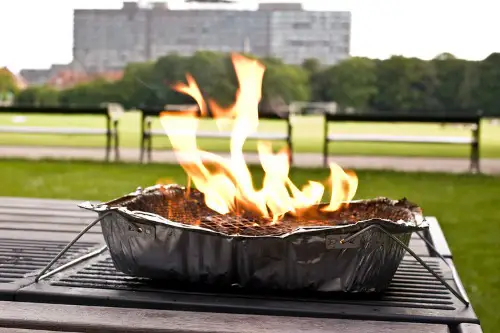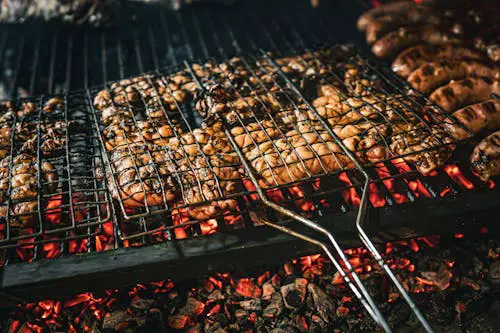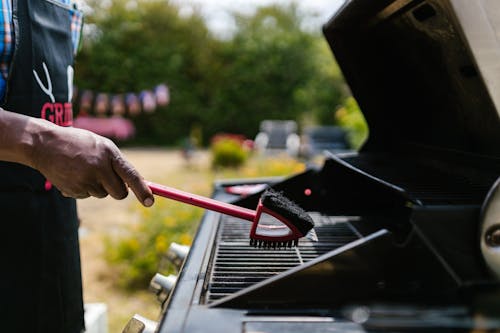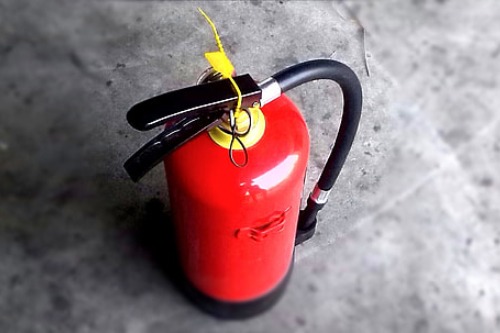1. Setting up too close to the house or flammable structures

We get it—lugging the grill out into the yard can feel like extra work. But setting up too close to your house, deck railings, or even overhanging branches is a serious fire risk. The U.S. Fire Administration reports that thousands of grill fires cause property damage every year. A safe rule of thumb is to keep your grill at least 10 feet from any structure.
Besides fire safety, spacing your setup properly gives you more room to move around while you’re cooking. You won’t be constantly bumping into furniture or squeezing between tight spots. This helps avoid spills, burns, and dropped food. Plus, smoke and grease won’t end up staining your siding.
2. Skipping the grill preheat

It’s tempting to toss food on the grill as soon as you light it, especially when everyone’s hungry. But skipping the preheat means your food won’t cook evenly, and you’re more likely to get sticking and flare-ups. A properly preheated grill sears meat better, locks in juices, and helps prevent dangerous undercooking. Aim for at least 10–15 minutes of preheating time, depending on your grill type.
When your grill is hot enough, it also burns off residue from your last session. This makes cleaning easier and helps avoid weird flavors transferring to your food. Gas grills usually take a bit less time to preheat than charcoal, but don’t rush it either way. The small wait pays off big when it comes to flavor and safety.
3. Forgetting to check your fuel supply ahead of time

Nothing kills barbecue joy like realizing you’re out of propane or charcoal halfway through cooking. It’s such an easy thing to overlook, especially if you haven’t grilled in a while. A quick fuel check before guests arrive can spare you a lot of stress. Running out mid-cook can lead to undercooked food or an awkward scramble to the store.
Propane tanks usually have a gauge, so get in the habit of checking it. With charcoal, give your bag a shake and make sure you’ve got enough for the meal. Remember, thicker cuts of meat or slow-cooked dishes burn through more fuel. Planning ahead means you can focus on the food, not the flame.
4. Neglecting to clean the grates before cooking

It’s easy to think a hot fire will take care of whatever’s left on your grates. But leftover grime can lead to bitter flavors and uneven cooking. Old bits of food and grease can also cause flare-ups, which make controlling the heat tricky. A dirty grill is just a recipe for frustration.
Use a sturdy grill brush or scraper to clean your grates once the grill is hot. This loosens up residue and preps the surface for better searing. If you let grime build up, it only gets harder to clean next time. Plus, cleaner grates help prevent your food from sticking and tearing.
5. Not setting up a dedicated prep area

Balancing a plate of raw burgers on your patio chair isn’t just awkward—it’s asking for trouble. Without a proper prep station, cross-contamination becomes a real risk. You might accidentally mix raw and cooked foods, or set utensils somewhere dirty. A small table or cart near your grill can make a huge difference.
It gives you a spot for marinades, platters, and tools, keeping everything organized. You’ll work more efficiently and feel less flustered during busy moments. It also cuts down on trips back inside, so you can focus on the grill. A little setup effort up front saves time and hassle later.
6. Ignoring wind direction when placing the grill

If you don’t think about the wind, you could end up with smoke blowing right into your face—or worse, into your guests’ seating area. Wind can also make it harder to maintain an even temperature, especially with charcoal grills. Strong gusts might even blow out a gas flame. Always take a second to feel where the breeze is coming from before you fire up.
Position your grill so the wind helps, rather than hinders, your cooking. Ideally, the smoke should drift away from where people are gathered. If it’s particularly breezy, consider using a natural windbreak, like a fence (while keeping safe distance). Managing wind keeps you more comfortable and helps with consistent heat.
7. Not having a fire extinguisher or water source nearby

It’s easy to overlook safety when you’re focused on the food. But grills can flare up fast, and you don’t want to be caught unprepared. Having a fire extinguisher or at least a bucket of water or sand nearby is just smart. It gives you peace of mind and buys valuable seconds in case something goes wrong.
Make sure the extinguisher is rated for grease fires—usually a Class B or multipurpose one. If you’re using water, remember that it’s fine for charcoal flare-ups, but never pour it on a grease fire. A garden hose can also work in a pinch, as long as it’s close at hand. Being ready for the unexpected helps keep your cookout safe and fun.
8. Overloading the grill with too much food at once

When you pile on the burgers, hot dogs, and veggies all at once, you’re setting yourself up for uneven cooking. Overcrowding lowers the grill’s temperature and prevents proper searing. It can also block airflow, leading to flare-ups and burnt spots. You’ll end up spending more time moving things around and less time enjoying yourself.
Instead, cook in batches and give each item room to breathe. This makes it easier to manage doneness and avoid charring. Plus, you’ll have fewer stress points to juggle at once. A less crowded grill equals tastier, better-cooked food and a happier cook.
This post 8 Barbecue Setup Mistakes That Make Outdoor Cooking a Chore was first published on Greenhouse Black.
